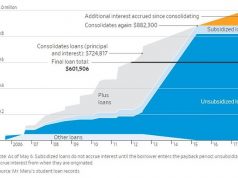Wall street is a mix of real financial analysis and emotional human psychology. If the latter were not so, there would not be any mispricing of companies, both on the cheap and expensive sides. I, for one, do not ascribe to the efficient market theory, because from one day to the next, the price of a security can rise or fall with zero change in the underlying business….many days, it rises and falls simply on the emotion of the investor.
When a company issues earnings guidance, it tries to let the market know what its underlying business is expected to do in the next quarter and fiscal year. However, this leads to a commitment bias on the part of the company and a confirmation bias on the part of the investing community. The company will try to meet those numbers, even if it has to do some clever financial engineering to meet them (and in some rare cases, outright fraud.) Investors measure whether to buy or sell the stock based on the difference between its expectations and the reality. A company could have explosive growth, but falls one penny short of expectations, and the stock price can take a hit because investors are depressed about that one penny EPS.
Warren is correct here; remove the biases that come from arbitrary expectation numbers.
Warren Buffett tells CNBC companies should stop issuing earnings guidance because it can lead to “malpractice.”
Read Full Story: Warren Buffett wants to end Wall Street’s broken earnings game









